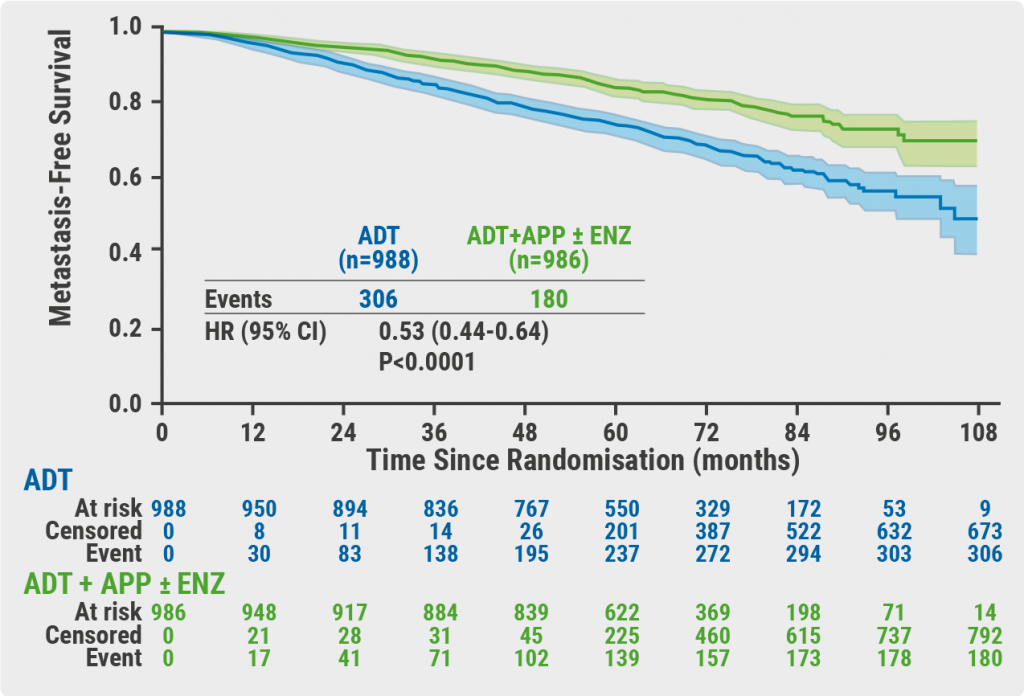From 9 February to 3 March 2021, the ESMO Resilience Task Force did a third global survey on the wellbeing and professional performance of oncology professionals. Dr Jonathan Lim (Imperial College London, UK) presented the results [1]. A total of 1,269 participants responded to the survey (54% aged >40 years, 55% female, 69% white ethnicity, 51% general hospital, 37% cancer centre, 73% medical oncologist, 22% trainees).
Compared with the first (April-May 2020, n=1,520) and second survey (July-August 2020, n=942), scores for risk of poor wellbeing/distress (40%), and feeling burned out (56%) were increased in the third survey. However, job performance score improved since the first survey (see Figure). In particular, young participants (≤40 years) and female participants appeared at significantly higher risk of poor wellbeing/distress (49% and 45%, respectively) and feeling burned out (61% and 63%, respectively). In addition, job demands had steadily increased. Significant increases were reported in feeling overwhelmed with workload, COVID-19-related clinical and research work, out-of-hours work, shift work, and overall working hours, and inadequate time for personal/family life. There were also concerns about the negative impact of the pandemic on career development/training, job security, and international fellowship opportunities. Overall, less than half of the participants felt supported by their work management, professional societies or government, and/or had access to wellbeing support services. One in four participants were considering changing their future career.
Figure: Comparison of survey results over time during the COVID-19 pandemic [1]

“There is a real threat of potential attrition in the current workforce. National and international stakeholders must act together to ensure robust recovery plans as we emerge from the COVID-19 crisis,” concluded Dr Lim.
- Lim J, et al. The future of the oncology workforce since COVID-19: Results of the ESMO Resilience Task Force survey series. Abstract 1561O, ESMO Congress 2021, 16–21 September.
Copyright ©2021 Medicom Medical Publishers
Posted on
Previous Article
« High COVID-19 mortality in Swiss cancer patients Next Article
Cancer patients more likely to die from COVID-19 when hospital admittance is required »
« High COVID-19 mortality in Swiss cancer patients Next Article
Cancer patients more likely to die from COVID-19 when hospital admittance is required »
Table of Contents: ESMO 2021
Featured articles
Breast Cancer
Trastuzumab deruxtecan triples PFS
Novel conjugate meets primary endpoint
Longest survival benefit from first-line CDK4/6 inhibitor
Meta-analysis shows 6-months adjuvant trastuzumab is optimal
Double-positive results for triple-negative metastatic breast cancer
Survival after neoadjuvant therapy with trastuzumab-lapatinib plus chemotherapy
Postmenopausal breast cancer: extended letrozole reduces recurrence
Asian women also benefit from palbociclib plus letrozole
No PEARLs of survival with palbociclib plus endocrine therapy compared with capecitabine, but QoL better
Gastrointestinal Cancer
Neoadjuvant chemotherapy potential alternative to neoadjuvant chemoradiotherapy in LARC
Immune chemo-sensitisation looks promising in microsatellite-stable mCRC
Adagrasib shows promising clinical activity in heavily pretreated KRAS-mutated CRC
Automated detection of microsatellite status on unstained samples in early colon cancer
Consistent benefit of anti-PD-1 therapy for oesophageal and gastric cancer
HIPEC in gastric cancer with peritoneal metastases
ctDNA highly predictive in HER2-positive, advanced gastric or gastro-oesophageal junction cancer
Lung Cancer
Robust anticancer activity of trastuzumab deruxtecan in HER2-mutated NSCLC
Nivolumab/ipilimumab continues to provide survival benefit in unresectable MPM
Adjuvant atezolizumab lowers relapse rate in resected NSCLC
Three-year OS follow-up from CASPIAN trial
TCR clonality predicts pembrolizumab response in NSCLC
Melanoma
Adjuvant immunotherapy reduces risk of disease recurrence in stage II melanoma
IFN-γ signature predicts response to immunotherapy
Updated results of SECOMBIT trial
Combining T-VEC and pembrolizumab does not significantly improve survival in advanced, unresectable melanoma
Durable intracranial responses with nivolumab/ipilimumab
Genitourinary Cancer
TKI drug-free interval strategy not detrimental to conventional continuation strategy in RCC
Modified ipilimumab schedule reduces risk of grade 3/4 adverse events
Optimal neoadjuvant dose ipilimumab/nivolumab in stage III urothelial cancer
Better survival with neoadjuvant dose-dense MVAC regimen in MIBC
PARP inhibitor rechallenge improves PFS in ovarian cancer
Pembrolizumab prolongs survival in persistent, recurrent, or metastatic cervical cancer
Pembrolizumab has durable effect in previously treated MSI-H/dMMR advanced endometrial cancer
HRR mutational status is prognostic and predictive biomarker olaparib activity
Haematological Cancer
Mutational analyses are predictive in malignant lymphomas
Low numbers of M2 macrophages in tumour microenvironment associated with superior response to immunotherapy in Hodgkin lymphoma
COVID-19
Adequate response to SARS-CoV-2 vaccine in cancer patients
Cancer patients more likely to die from COVID-19 when hospital admittance is required
Third global survey of the ESMO Resilience Task Force
High COVID-19 mortality in Swiss cancer patients
Basic Science & Translational Research
Neutrophils negatively correlate with response to anti-PD-1 monotherapy in dMMR tumours
Tetraspecific ANKETs harnesses innate immunity in cancer therapies
Early ctDNA reduction in metastatic uveal melanoma correlates better with OS than RECIST response
Gut microbiota as a potential predictive biomarker
Related Articles

November 19, 2021
Updated results of SECOMBIT trial
November 19, 2021
Adequate response to SARS-CoV-2 vaccine in cancer patients
© 2024 Medicom Medical Publishers. All rights reserved. Terms and Conditions | Privacy Policy
HEAD OFFICE
Laarderhoogtweg 25
1101 EB Amsterdam
The Netherlands
T: +31 85 4012 560
E: publishers@medicom-publishers.com

